Easing the Transition: Strategies for New Nurses Entering Practice
VerifiedAdded on 2023/06/05
|13
|3279
|55
Essay
AI Summary
This essay addresses the challenges faced by newly graduating nurses transitioning into clinical practice. It highlights the difficulties they encounter, such as heavy workloads, unclear job responsibilities, workplace discrimination and the gap between theoretical knowledge and practical application, leading to burnout and mental health issues. The essay discusses research findings emphasizing the importance of support systems, mentoring programs, and clear job roles. Strategies to mitigate these challenges include transition support programs, proper orientation, avoiding complex patient assignments initially, integrating clinical honors programs in nursing education, and providing emotional support. The ultimate goal is to enhance the transition experience, improve nurse retention rates, and ensure patient safety. Desklib provides access to similar solved assignments and resources for students.
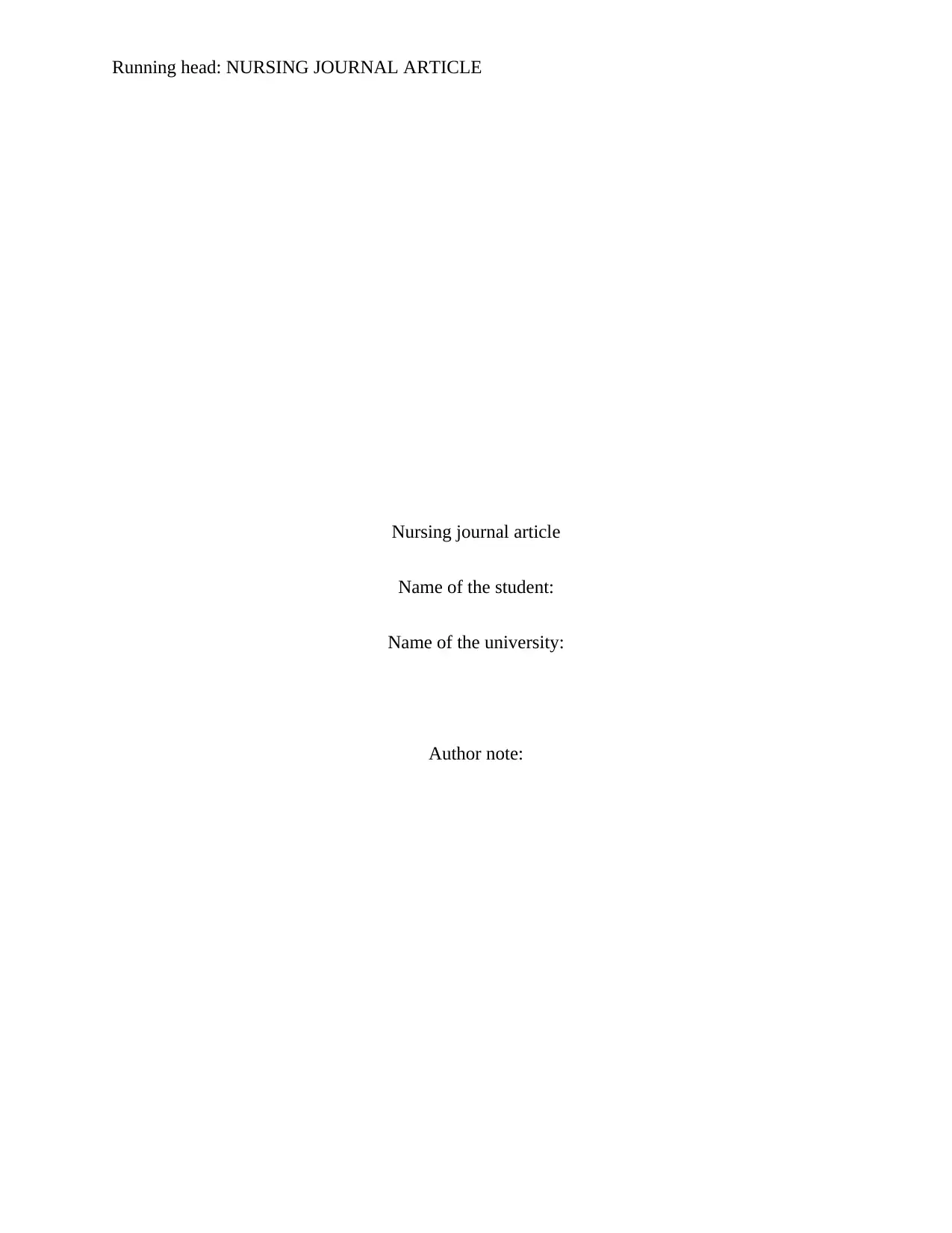
Running head: NURSING JOURNAL ARTICLE
Nursing journal article
Name of the student:
Name of the university:
Author note:
Nursing journal article
Name of the student:
Name of the university:
Author note:
Paraphrase This Document
Need a fresh take? Get an instant paraphrase of this document with our AI Paraphraser
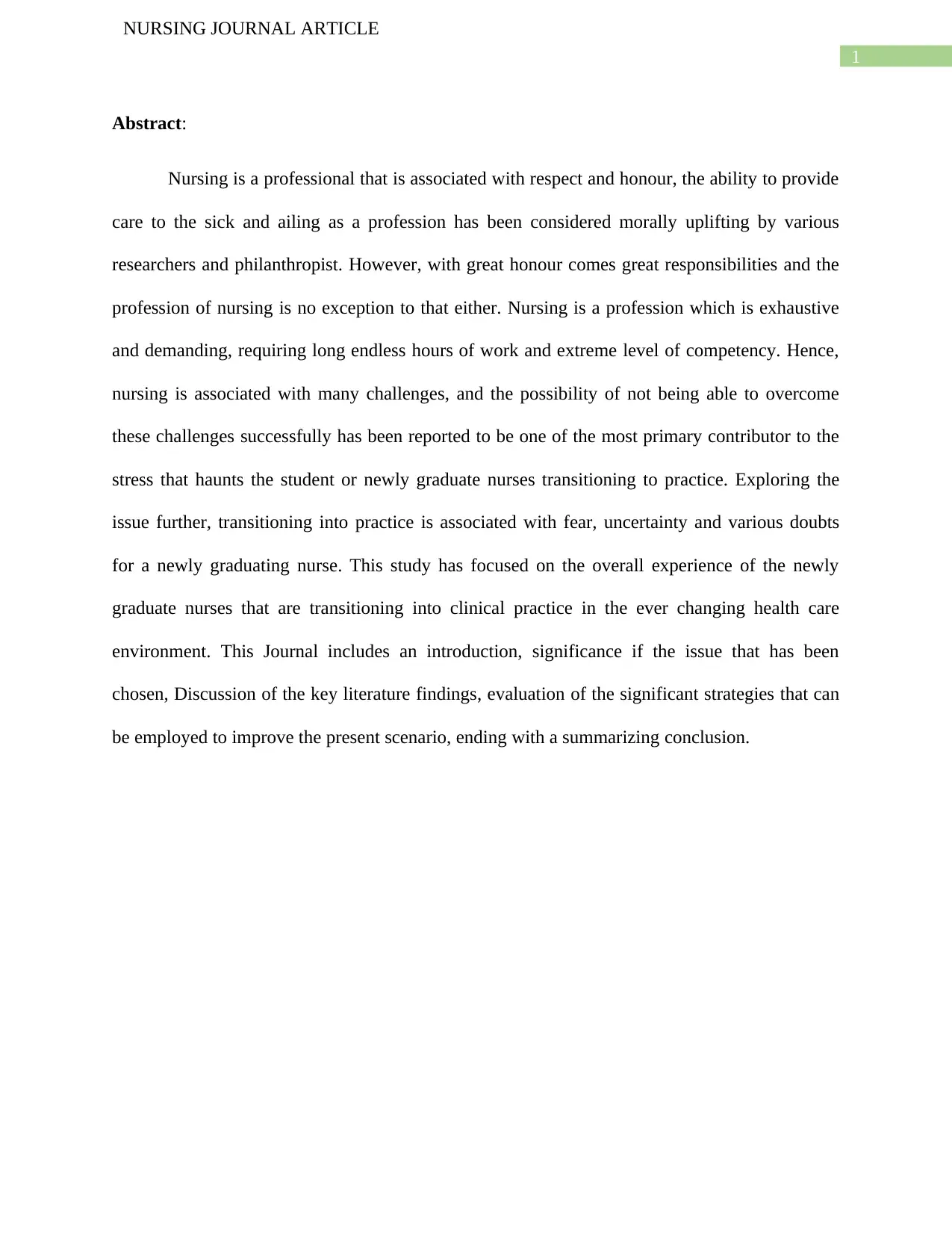
1
NURSING JOURNAL ARTICLE
Abstract:
Nursing is a professional that is associated with respect and honour, the ability to provide
care to the sick and ailing as a profession has been considered morally uplifting by various
researchers and philanthropist. However, with great honour comes great responsibilities and the
profession of nursing is no exception to that either. Nursing is a profession which is exhaustive
and demanding, requiring long endless hours of work and extreme level of competency. Hence,
nursing is associated with many challenges, and the possibility of not being able to overcome
these challenges successfully has been reported to be one of the most primary contributor to the
stress that haunts the student or newly graduate nurses transitioning to practice. Exploring the
issue further, transitioning into practice is associated with fear, uncertainty and various doubts
for a newly graduating nurse. This study has focused on the overall experience of the newly
graduate nurses that are transitioning into clinical practice in the ever changing health care
environment. This Journal includes an introduction, significance if the issue that has been
chosen, Discussion of the key literature findings, evaluation of the significant strategies that can
be employed to improve the present scenario, ending with a summarizing conclusion.
NURSING JOURNAL ARTICLE
Abstract:
Nursing is a professional that is associated with respect and honour, the ability to provide
care to the sick and ailing as a profession has been considered morally uplifting by various
researchers and philanthropist. However, with great honour comes great responsibilities and the
profession of nursing is no exception to that either. Nursing is a profession which is exhaustive
and demanding, requiring long endless hours of work and extreme level of competency. Hence,
nursing is associated with many challenges, and the possibility of not being able to overcome
these challenges successfully has been reported to be one of the most primary contributor to the
stress that haunts the student or newly graduate nurses transitioning to practice. Exploring the
issue further, transitioning into practice is associated with fear, uncertainty and various doubts
for a newly graduating nurse. This study has focused on the overall experience of the newly
graduate nurses that are transitioning into clinical practice in the ever changing health care
environment. This Journal includes an introduction, significance if the issue that has been
chosen, Discussion of the key literature findings, evaluation of the significant strategies that can
be employed to improve the present scenario, ending with a summarizing conclusion.
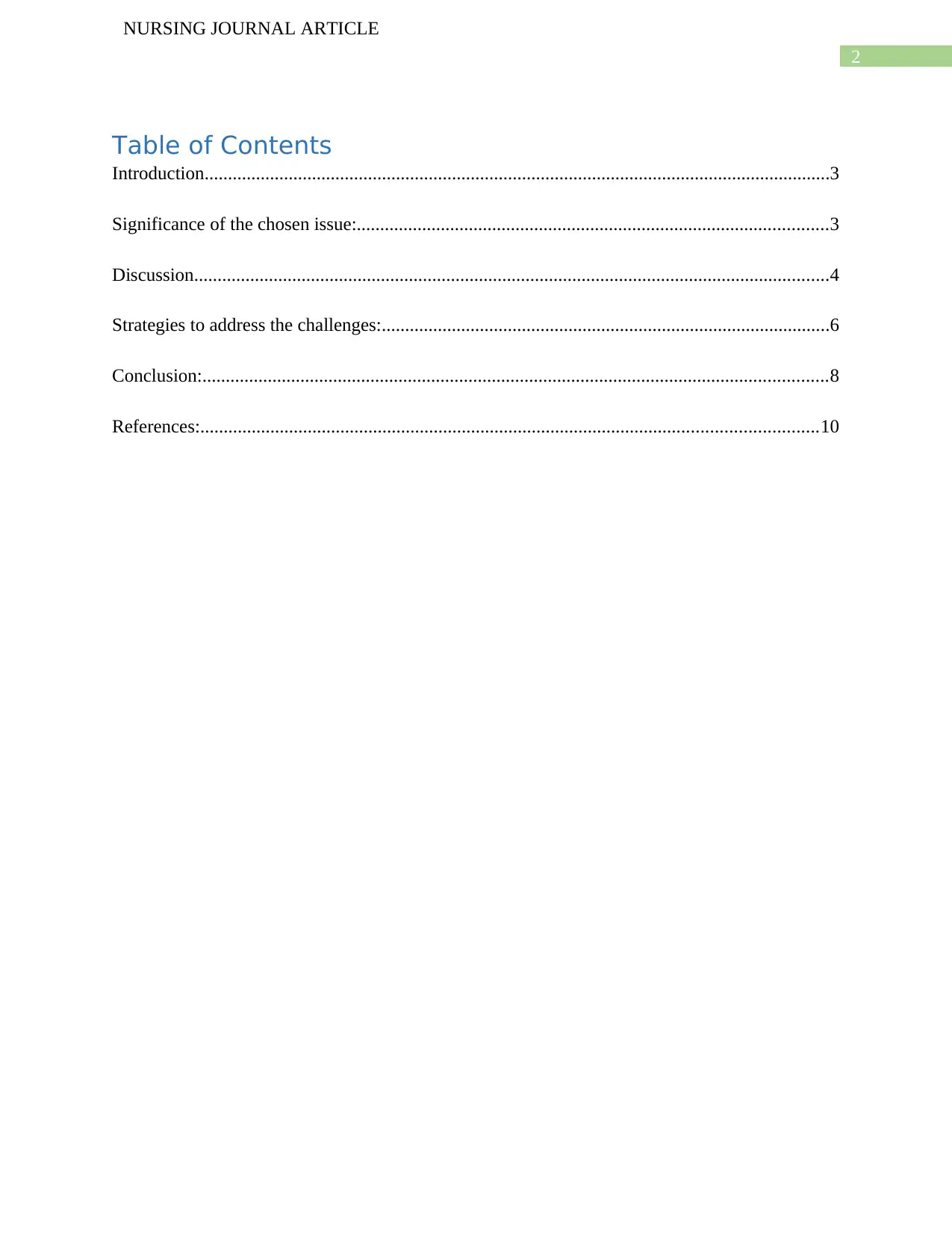
2
NURSING JOURNAL ARTICLE
Table of Contents
Introduction......................................................................................................................................3
Significance of the chosen issue:.....................................................................................................3
Discussion........................................................................................................................................4
Strategies to address the challenges:................................................................................................6
Conclusion:......................................................................................................................................8
References:....................................................................................................................................10
NURSING JOURNAL ARTICLE
Table of Contents
Introduction......................................................................................................................................3
Significance of the chosen issue:.....................................................................................................3
Discussion........................................................................................................................................4
Strategies to address the challenges:................................................................................................6
Conclusion:......................................................................................................................................8
References:....................................................................................................................................10
⊘ This is a preview!⊘
Do you want full access?
Subscribe today to unlock all pages.

Trusted by 1+ million students worldwide
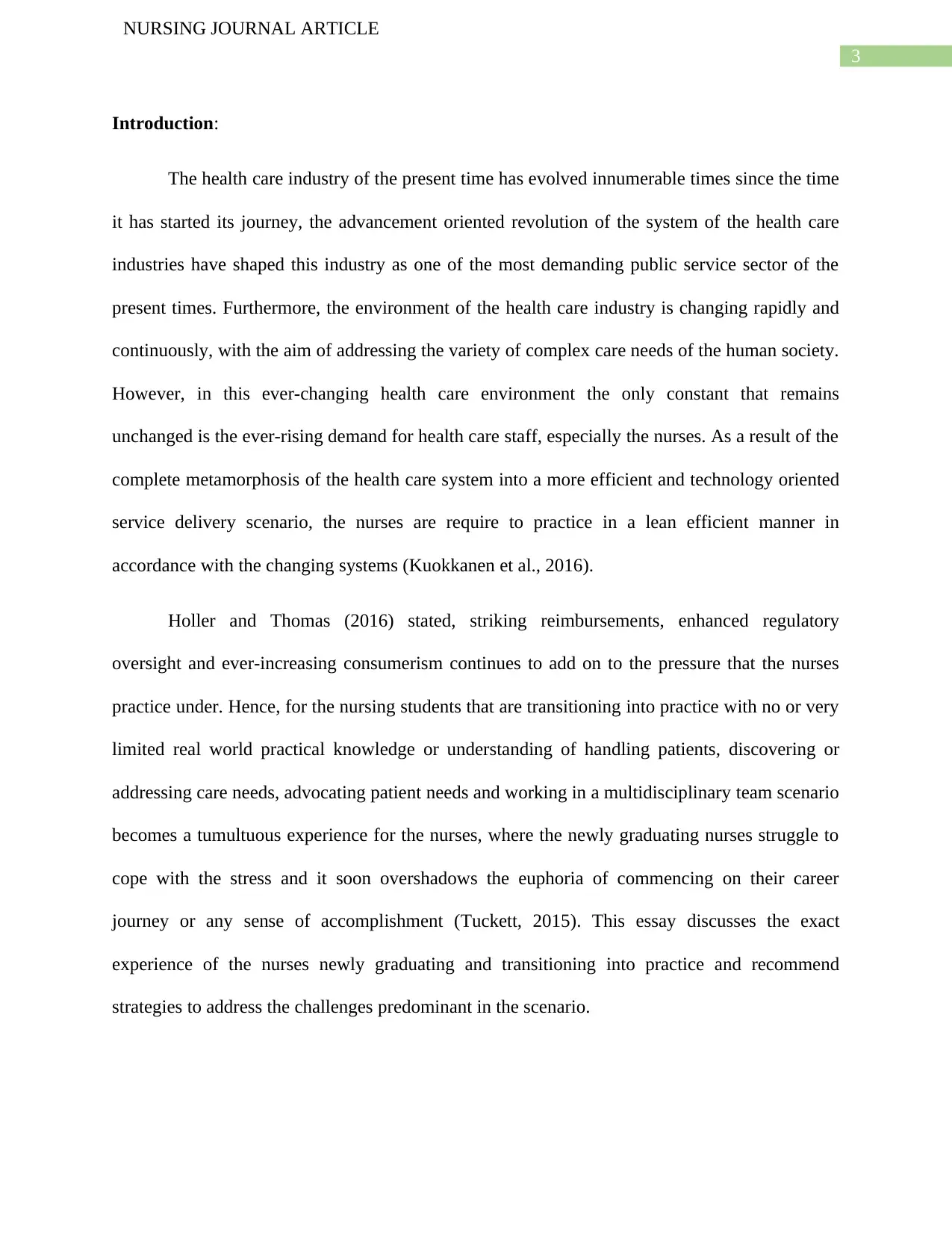
3
NURSING JOURNAL ARTICLE
Introduction:
The health care industry of the present time has evolved innumerable times since the time
it has started its journey, the advancement oriented revolution of the system of the health care
industries have shaped this industry as one of the most demanding public service sector of the
present times. Furthermore, the environment of the health care industry is changing rapidly and
continuously, with the aim of addressing the variety of complex care needs of the human society.
However, in this ever-changing health care environment the only constant that remains
unchanged is the ever-rising demand for health care staff, especially the nurses. As a result of the
complete metamorphosis of the health care system into a more efficient and technology oriented
service delivery scenario, the nurses are require to practice in a lean efficient manner in
accordance with the changing systems (Kuokkanen et al., 2016).
Holler and Thomas (2016) stated, striking reimbursements, enhanced regulatory
oversight and ever-increasing consumerism continues to add on to the pressure that the nurses
practice under. Hence, for the nursing students that are transitioning into practice with no or very
limited real world practical knowledge or understanding of handling patients, discovering or
addressing care needs, advocating patient needs and working in a multidisciplinary team scenario
becomes a tumultuous experience for the nurses, where the newly graduating nurses struggle to
cope with the stress and it soon overshadows the euphoria of commencing on their career
journey or any sense of accomplishment (Tuckett, 2015). This essay discusses the exact
experience of the nurses newly graduating and transitioning into practice and recommend
strategies to address the challenges predominant in the scenario.
NURSING JOURNAL ARTICLE
Introduction:
The health care industry of the present time has evolved innumerable times since the time
it has started its journey, the advancement oriented revolution of the system of the health care
industries have shaped this industry as one of the most demanding public service sector of the
present times. Furthermore, the environment of the health care industry is changing rapidly and
continuously, with the aim of addressing the variety of complex care needs of the human society.
However, in this ever-changing health care environment the only constant that remains
unchanged is the ever-rising demand for health care staff, especially the nurses. As a result of the
complete metamorphosis of the health care system into a more efficient and technology oriented
service delivery scenario, the nurses are require to practice in a lean efficient manner in
accordance with the changing systems (Kuokkanen et al., 2016).
Holler and Thomas (2016) stated, striking reimbursements, enhanced regulatory
oversight and ever-increasing consumerism continues to add on to the pressure that the nurses
practice under. Hence, for the nursing students that are transitioning into practice with no or very
limited real world practical knowledge or understanding of handling patients, discovering or
addressing care needs, advocating patient needs and working in a multidisciplinary team scenario
becomes a tumultuous experience for the nurses, where the newly graduating nurses struggle to
cope with the stress and it soon overshadows the euphoria of commencing on their career
journey or any sense of accomplishment (Tuckett, 2015). This essay discusses the exact
experience of the nurses newly graduating and transitioning into practice and recommend
strategies to address the challenges predominant in the scenario.
Paraphrase This Document
Need a fresh take? Get an instant paraphrase of this document with our AI Paraphraser
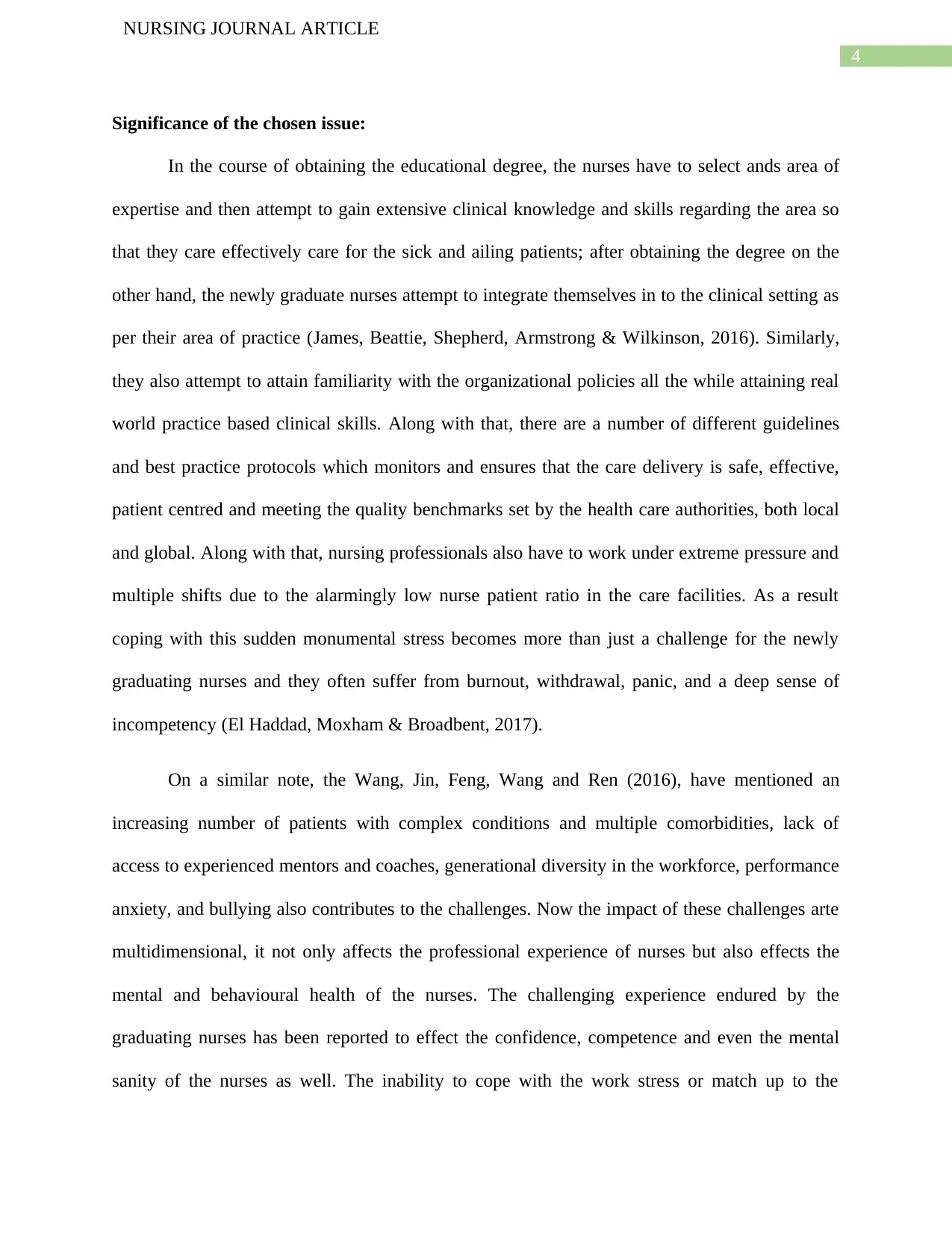
4
NURSING JOURNAL ARTICLE
Significance of the chosen issue:
In the course of obtaining the educational degree, the nurses have to select ands area of
expertise and then attempt to gain extensive clinical knowledge and skills regarding the area so
that they care effectively care for the sick and ailing patients; after obtaining the degree on the
other hand, the newly graduate nurses attempt to integrate themselves in to the clinical setting as
per their area of practice (James, Beattie, Shepherd, Armstrong & Wilkinson, 2016). Similarly,
they also attempt to attain familiarity with the organizational policies all the while attaining real
world practice based clinical skills. Along with that, there are a number of different guidelines
and best practice protocols which monitors and ensures that the care delivery is safe, effective,
patient centred and meeting the quality benchmarks set by the health care authorities, both local
and global. Along with that, nursing professionals also have to work under extreme pressure and
multiple shifts due to the alarmingly low nurse patient ratio in the care facilities. As a result
coping with this sudden monumental stress becomes more than just a challenge for the newly
graduating nurses and they often suffer from burnout, withdrawal, panic, and a deep sense of
incompetency (El Haddad, Moxham & Broadbent, 2017).
On a similar note, the Wang, Jin, Feng, Wang and Ren (2016), have mentioned an
increasing number of patients with complex conditions and multiple comorbidities, lack of
access to experienced mentors and coaches, generational diversity in the workforce, performance
anxiety, and bullying also contributes to the challenges. Now the impact of these challenges arte
multidimensional, it not only affects the professional experience of nurses but also effects the
mental and behavioural health of the nurses. The challenging experience endured by the
graduating nurses has been reported to effect the confidence, competence and even the mental
sanity of the nurses as well. The inability to cope with the work stress or match up to the
NURSING JOURNAL ARTICLE
Significance of the chosen issue:
In the course of obtaining the educational degree, the nurses have to select ands area of
expertise and then attempt to gain extensive clinical knowledge and skills regarding the area so
that they care effectively care for the sick and ailing patients; after obtaining the degree on the
other hand, the newly graduate nurses attempt to integrate themselves in to the clinical setting as
per their area of practice (James, Beattie, Shepherd, Armstrong & Wilkinson, 2016). Similarly,
they also attempt to attain familiarity with the organizational policies all the while attaining real
world practice based clinical skills. Along with that, there are a number of different guidelines
and best practice protocols which monitors and ensures that the care delivery is safe, effective,
patient centred and meeting the quality benchmarks set by the health care authorities, both local
and global. Along with that, nursing professionals also have to work under extreme pressure and
multiple shifts due to the alarmingly low nurse patient ratio in the care facilities. As a result
coping with this sudden monumental stress becomes more than just a challenge for the newly
graduating nurses and they often suffer from burnout, withdrawal, panic, and a deep sense of
incompetency (El Haddad, Moxham & Broadbent, 2017).
On a similar note, the Wang, Jin, Feng, Wang and Ren (2016), have mentioned an
increasing number of patients with complex conditions and multiple comorbidities, lack of
access to experienced mentors and coaches, generational diversity in the workforce, performance
anxiety, and bullying also contributes to the challenges. Now the impact of these challenges arte
multidimensional, it not only affects the professional experience of nurses but also effects the
mental and behavioural health of the nurses. The challenging experience endured by the
graduating nurses has been reported to effect the confidence, competence and even the mental
sanity of the nurses as well. The inability to cope with the work stress or match up to the
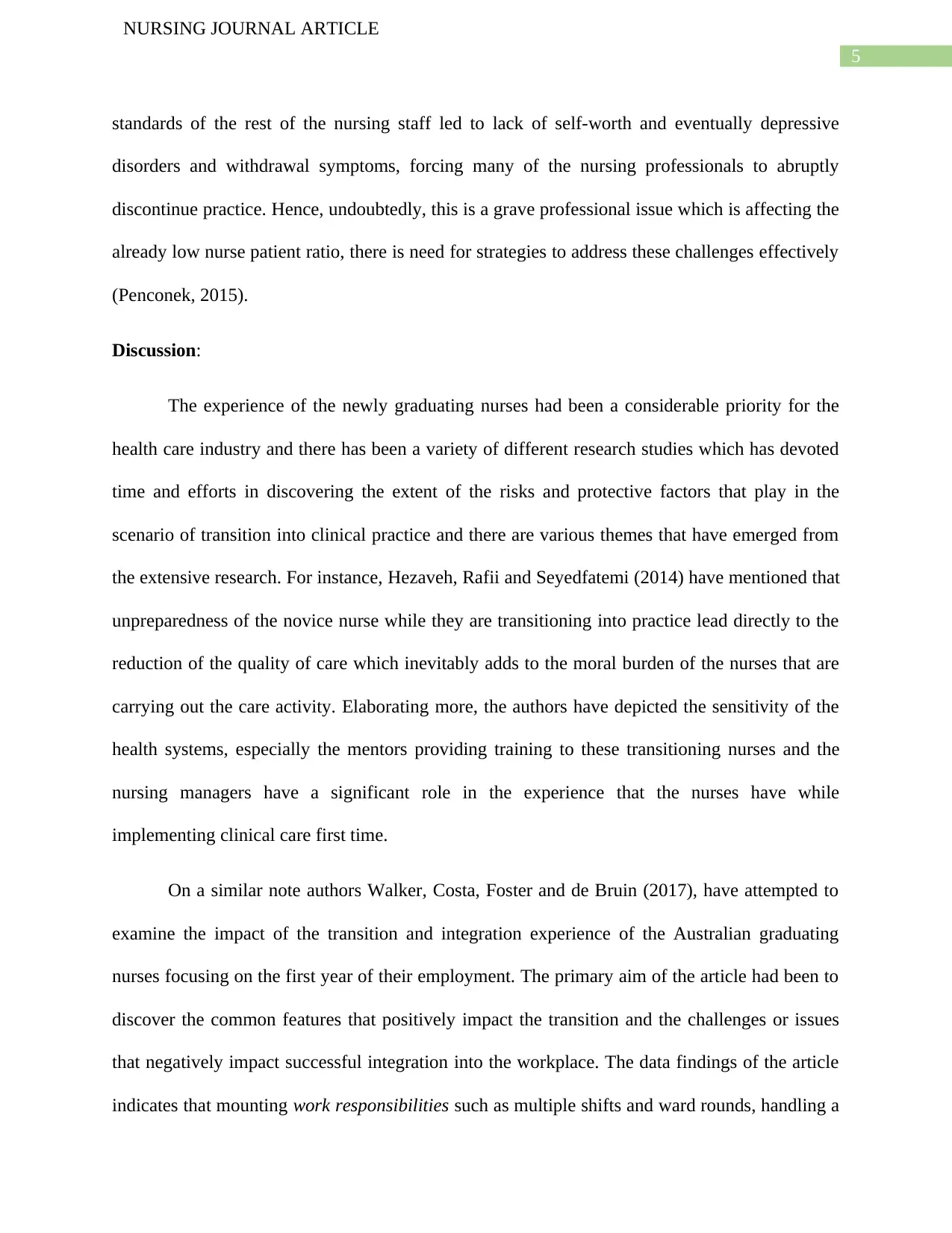
5
NURSING JOURNAL ARTICLE
standards of the rest of the nursing staff led to lack of self-worth and eventually depressive
disorders and withdrawal symptoms, forcing many of the nursing professionals to abruptly
discontinue practice. Hence, undoubtedly, this is a grave professional issue which is affecting the
already low nurse patient ratio, there is need for strategies to address these challenges effectively
(Penconek, 2015).
Discussion:
The experience of the newly graduating nurses had been a considerable priority for the
health care industry and there has been a variety of different research studies which has devoted
time and efforts in discovering the extent of the risks and protective factors that play in the
scenario of transition into clinical practice and there are various themes that have emerged from
the extensive research. For instance, Hezaveh, Rafii and Seyedfatemi (2014) have mentioned that
unpreparedness of the novice nurse while they are transitioning into practice lead directly to the
reduction of the quality of care which inevitably adds to the moral burden of the nurses that are
carrying out the care activity. Elaborating more, the authors have depicted the sensitivity of the
health systems, especially the mentors providing training to these transitioning nurses and the
nursing managers have a significant role in the experience that the nurses have while
implementing clinical care first time.
On a similar note authors Walker, Costa, Foster and de Bruin (2017), have attempted to
examine the impact of the transition and integration experience of the Australian graduating
nurses focusing on the first year of their employment. The primary aim of the article had been to
discover the common features that positively impact the transition and the challenges or issues
that negatively impact successful integration into the workplace. The data findings of the article
indicates that mounting work responsibilities such as multiple shifts and ward rounds, handling a
NURSING JOURNAL ARTICLE
standards of the rest of the nursing staff led to lack of self-worth and eventually depressive
disorders and withdrawal symptoms, forcing many of the nursing professionals to abruptly
discontinue practice. Hence, undoubtedly, this is a grave professional issue which is affecting the
already low nurse patient ratio, there is need for strategies to address these challenges effectively
(Penconek, 2015).
Discussion:
The experience of the newly graduating nurses had been a considerable priority for the
health care industry and there has been a variety of different research studies which has devoted
time and efforts in discovering the extent of the risks and protective factors that play in the
scenario of transition into clinical practice and there are various themes that have emerged from
the extensive research. For instance, Hezaveh, Rafii and Seyedfatemi (2014) have mentioned that
unpreparedness of the novice nurse while they are transitioning into practice lead directly to the
reduction of the quality of care which inevitably adds to the moral burden of the nurses that are
carrying out the care activity. Elaborating more, the authors have depicted the sensitivity of the
health systems, especially the mentors providing training to these transitioning nurses and the
nursing managers have a significant role in the experience that the nurses have while
implementing clinical care first time.
On a similar note authors Walker, Costa, Foster and de Bruin (2017), have attempted to
examine the impact of the transition and integration experience of the Australian graduating
nurses focusing on the first year of their employment. The primary aim of the article had been to
discover the common features that positively impact the transition and the challenges or issues
that negatively impact successful integration into the workplace. The data findings of the article
indicates that mounting work responsibilities such as multiple shifts and ward rounds, handling a
⊘ This is a preview!⊘
Do you want full access?
Subscribe today to unlock all pages.

Trusted by 1+ million students worldwide
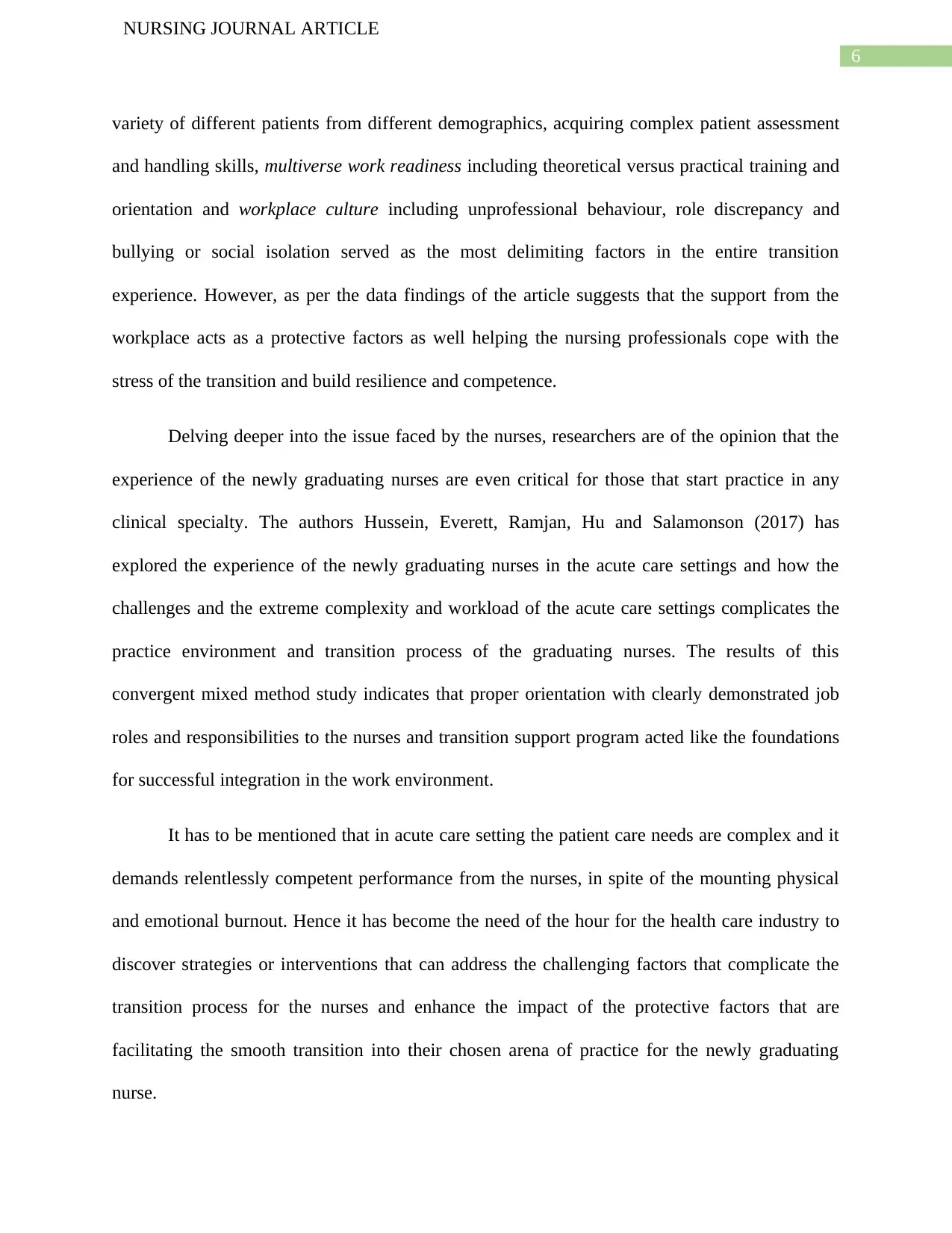
6
NURSING JOURNAL ARTICLE
variety of different patients from different demographics, acquiring complex patient assessment
and handling skills, multiverse work readiness including theoretical versus practical training and
orientation and workplace culture including unprofessional behaviour, role discrepancy and
bullying or social isolation served as the most delimiting factors in the entire transition
experience. However, as per the data findings of the article suggests that the support from the
workplace acts as a protective factors as well helping the nursing professionals cope with the
stress of the transition and build resilience and competence.
Delving deeper into the issue faced by the nurses, researchers are of the opinion that the
experience of the newly graduating nurses are even critical for those that start practice in any
clinical specialty. The authors Hussein, Everett, Ramjan, Hu and Salamonson (2017) has
explored the experience of the newly graduating nurses in the acute care settings and how the
challenges and the extreme complexity and workload of the acute care settings complicates the
practice environment and transition process of the graduating nurses. The results of this
convergent mixed method study indicates that proper orientation with clearly demonstrated job
roles and responsibilities to the nurses and transition support program acted like the foundations
for successful integration in the work environment.
It has to be mentioned that in acute care setting the patient care needs are complex and it
demands relentlessly competent performance from the nurses, in spite of the mounting physical
and emotional burnout. Hence it has become the need of the hour for the health care industry to
discover strategies or interventions that can address the challenging factors that complicate the
transition process for the nurses and enhance the impact of the protective factors that are
facilitating the smooth transition into their chosen arena of practice for the newly graduating
nurse.
NURSING JOURNAL ARTICLE
variety of different patients from different demographics, acquiring complex patient assessment
and handling skills, multiverse work readiness including theoretical versus practical training and
orientation and workplace culture including unprofessional behaviour, role discrepancy and
bullying or social isolation served as the most delimiting factors in the entire transition
experience. However, as per the data findings of the article suggests that the support from the
workplace acts as a protective factors as well helping the nursing professionals cope with the
stress of the transition and build resilience and competence.
Delving deeper into the issue faced by the nurses, researchers are of the opinion that the
experience of the newly graduating nurses are even critical for those that start practice in any
clinical specialty. The authors Hussein, Everett, Ramjan, Hu and Salamonson (2017) has
explored the experience of the newly graduating nurses in the acute care settings and how the
challenges and the extreme complexity and workload of the acute care settings complicates the
practice environment and transition process of the graduating nurses. The results of this
convergent mixed method study indicates that proper orientation with clearly demonstrated job
roles and responsibilities to the nurses and transition support program acted like the foundations
for successful integration in the work environment.
It has to be mentioned that in acute care setting the patient care needs are complex and it
demands relentlessly competent performance from the nurses, in spite of the mounting physical
and emotional burnout. Hence it has become the need of the hour for the health care industry to
discover strategies or interventions that can address the challenging factors that complicate the
transition process for the nurses and enhance the impact of the protective factors that are
facilitating the smooth transition into their chosen arena of practice for the newly graduating
nurse.
Paraphrase This Document
Need a fresh take? Get an instant paraphrase of this document with our AI Paraphraser
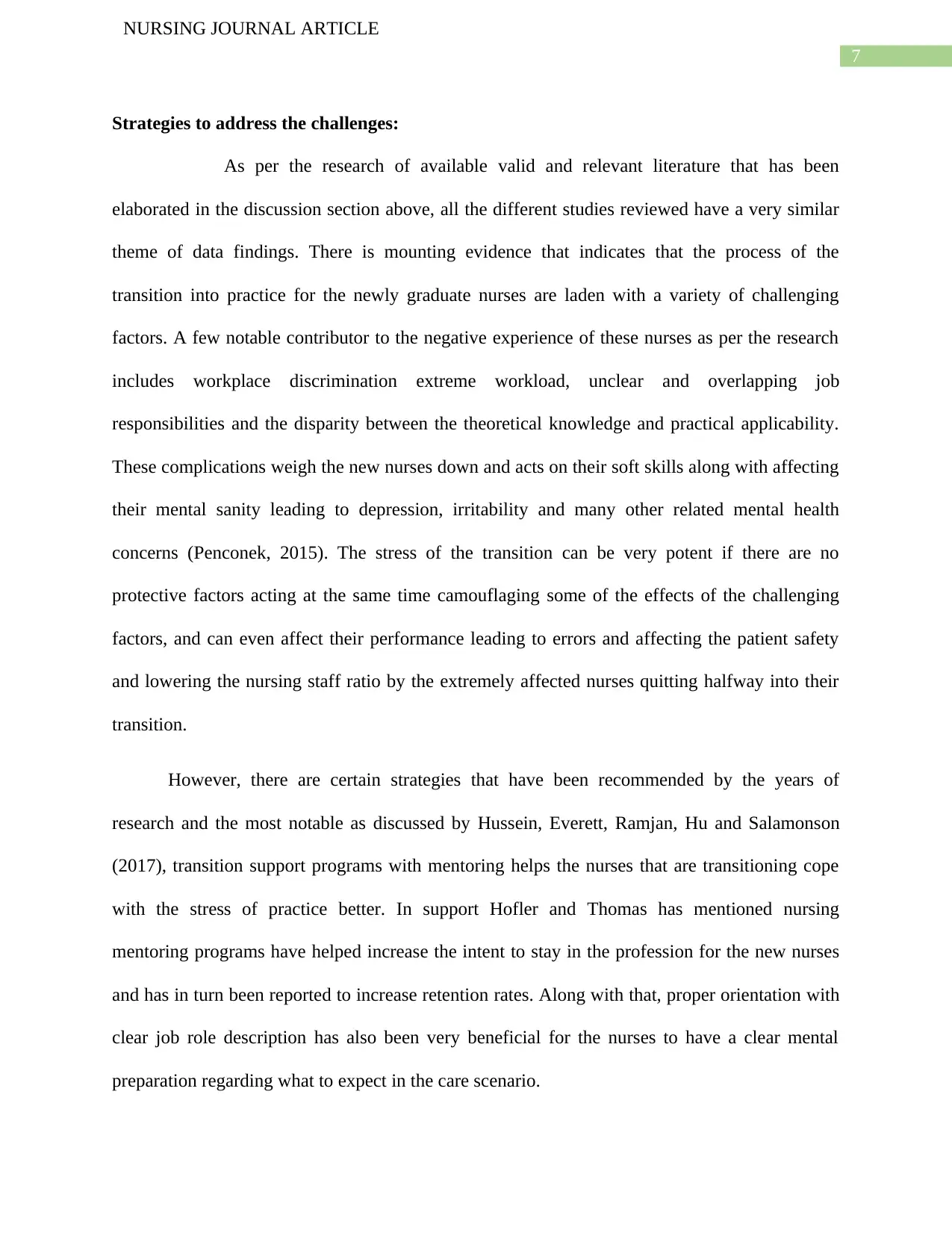
7
NURSING JOURNAL ARTICLE
Strategies to address the challenges:
As per the research of available valid and relevant literature that has been
elaborated in the discussion section above, all the different studies reviewed have a very similar
theme of data findings. There is mounting evidence that indicates that the process of the
transition into practice for the newly graduate nurses are laden with a variety of challenging
factors. A few notable contributor to the negative experience of these nurses as per the research
includes workplace discrimination extreme workload, unclear and overlapping job
responsibilities and the disparity between the theoretical knowledge and practical applicability.
These complications weigh the new nurses down and acts on their soft skills along with affecting
their mental sanity leading to depression, irritability and many other related mental health
concerns (Penconek, 2015). The stress of the transition can be very potent if there are no
protective factors acting at the same time camouflaging some of the effects of the challenging
factors, and can even affect their performance leading to errors and affecting the patient safety
and lowering the nursing staff ratio by the extremely affected nurses quitting halfway into their
transition.
However, there are certain strategies that have been recommended by the years of
research and the most notable as discussed by Hussein, Everett, Ramjan, Hu and Salamonson
(2017), transition support programs with mentoring helps the nurses that are transitioning cope
with the stress of practice better. In support Hofler and Thomas has mentioned nursing
mentoring programs have helped increase the intent to stay in the profession for the new nurses
and has in turn been reported to increase retention rates. Along with that, proper orientation with
clear job role description has also been very beneficial for the nurses to have a clear mental
preparation regarding what to expect in the care scenario.
NURSING JOURNAL ARTICLE
Strategies to address the challenges:
As per the research of available valid and relevant literature that has been
elaborated in the discussion section above, all the different studies reviewed have a very similar
theme of data findings. There is mounting evidence that indicates that the process of the
transition into practice for the newly graduate nurses are laden with a variety of challenging
factors. A few notable contributor to the negative experience of these nurses as per the research
includes workplace discrimination extreme workload, unclear and overlapping job
responsibilities and the disparity between the theoretical knowledge and practical applicability.
These complications weigh the new nurses down and acts on their soft skills along with affecting
their mental sanity leading to depression, irritability and many other related mental health
concerns (Penconek, 2015). The stress of the transition can be very potent if there are no
protective factors acting at the same time camouflaging some of the effects of the challenging
factors, and can even affect their performance leading to errors and affecting the patient safety
and lowering the nursing staff ratio by the extremely affected nurses quitting halfway into their
transition.
However, there are certain strategies that have been recommended by the years of
research and the most notable as discussed by Hussein, Everett, Ramjan, Hu and Salamonson
(2017), transition support programs with mentoring helps the nurses that are transitioning cope
with the stress of practice better. In support Hofler and Thomas has mentioned nursing
mentoring programs have helped increase the intent to stay in the profession for the new nurses
and has in turn been reported to increase retention rates. Along with that, proper orientation with
clear job role description has also been very beneficial for the nurses to have a clear mental
preparation regarding what to expect in the care scenario.
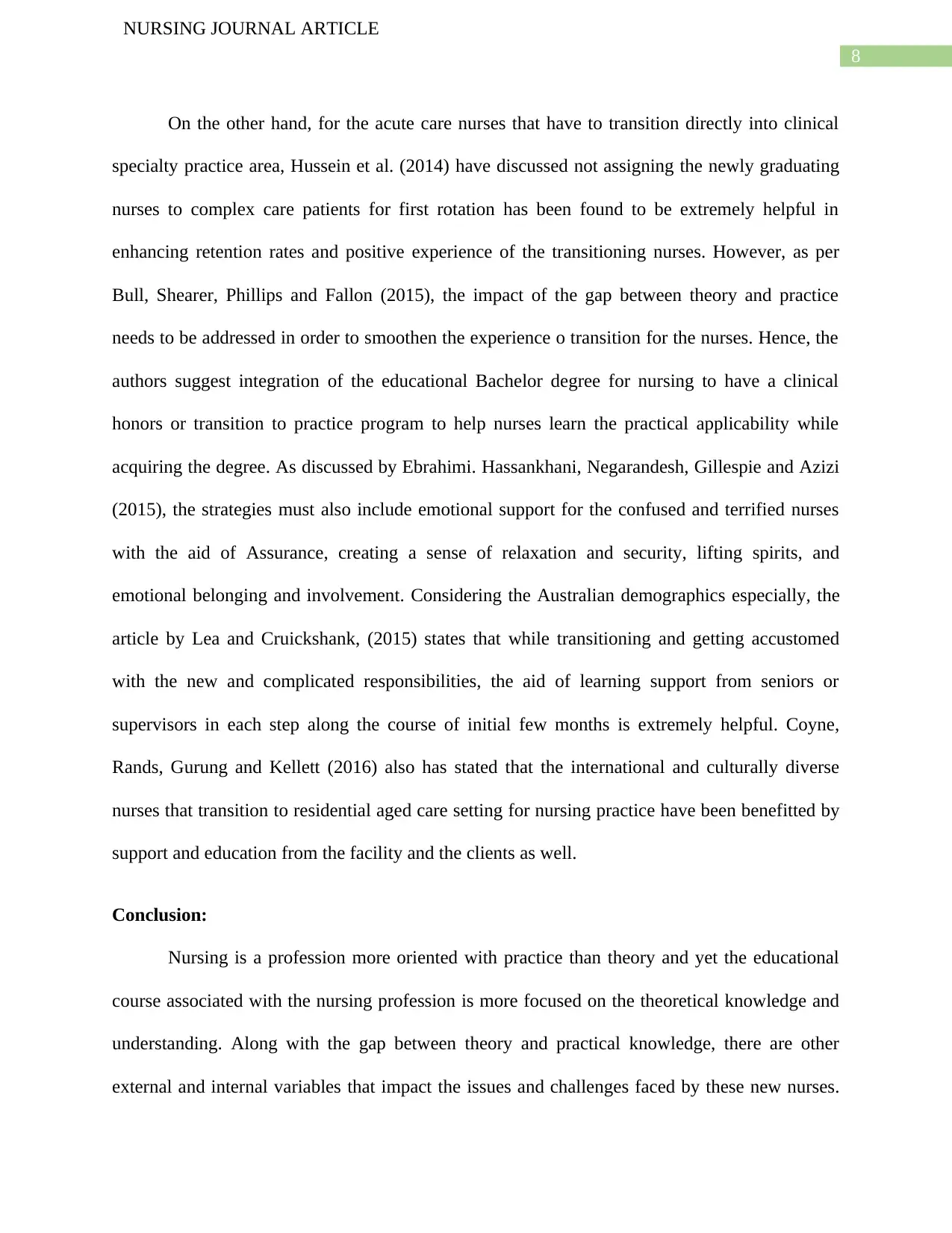
8
NURSING JOURNAL ARTICLE
On the other hand, for the acute care nurses that have to transition directly into clinical
specialty practice area, Hussein et al. (2014) have discussed not assigning the newly graduating
nurses to complex care patients for first rotation has been found to be extremely helpful in
enhancing retention rates and positive experience of the transitioning nurses. However, as per
Bull, Shearer, Phillips and Fallon (2015), the impact of the gap between theory and practice
needs to be addressed in order to smoothen the experience o transition for the nurses. Hence, the
authors suggest integration of the educational Bachelor degree for nursing to have a clinical
honors or transition to practice program to help nurses learn the practical applicability while
acquiring the degree. As discussed by Ebrahimi. Hassankhani, Negarandesh, Gillespie and Azizi
(2015), the strategies must also include emotional support for the confused and terrified nurses
with the aid of Assurance, creating a sense of relaxation and security, lifting spirits, and
emotional belonging and involvement. Considering the Australian demographics especially, the
article by Lea and Cruickshank, (2015) states that while transitioning and getting accustomed
with the new and complicated responsibilities, the aid of learning support from seniors or
supervisors in each step along the course of initial few months is extremely helpful. Coyne,
Rands, Gurung and Kellett (2016) also has stated that the international and culturally diverse
nurses that transition to residential aged care setting for nursing practice have been benefitted by
support and education from the facility and the clients as well.
Conclusion:
Nursing is a profession more oriented with practice than theory and yet the educational
course associated with the nursing profession is more focused on the theoretical knowledge and
understanding. Along with the gap between theory and practical knowledge, there are other
external and internal variables that impact the issues and challenges faced by these new nurses.
NURSING JOURNAL ARTICLE
On the other hand, for the acute care nurses that have to transition directly into clinical
specialty practice area, Hussein et al. (2014) have discussed not assigning the newly graduating
nurses to complex care patients for first rotation has been found to be extremely helpful in
enhancing retention rates and positive experience of the transitioning nurses. However, as per
Bull, Shearer, Phillips and Fallon (2015), the impact of the gap between theory and practice
needs to be addressed in order to smoothen the experience o transition for the nurses. Hence, the
authors suggest integration of the educational Bachelor degree for nursing to have a clinical
honors or transition to practice program to help nurses learn the practical applicability while
acquiring the degree. As discussed by Ebrahimi. Hassankhani, Negarandesh, Gillespie and Azizi
(2015), the strategies must also include emotional support for the confused and terrified nurses
with the aid of Assurance, creating a sense of relaxation and security, lifting spirits, and
emotional belonging and involvement. Considering the Australian demographics especially, the
article by Lea and Cruickshank, (2015) states that while transitioning and getting accustomed
with the new and complicated responsibilities, the aid of learning support from seniors or
supervisors in each step along the course of initial few months is extremely helpful. Coyne,
Rands, Gurung and Kellett (2016) also has stated that the international and culturally diverse
nurses that transition to residential aged care setting for nursing practice have been benefitted by
support and education from the facility and the clients as well.
Conclusion:
Nursing is a profession more oriented with practice than theory and yet the educational
course associated with the nursing profession is more focused on the theoretical knowledge and
understanding. Along with the gap between theory and practical knowledge, there are other
external and internal variables that impact the issues and challenges faced by these new nurses.
⊘ This is a preview!⊘
Do you want full access?
Subscribe today to unlock all pages.

Trusted by 1+ million students worldwide
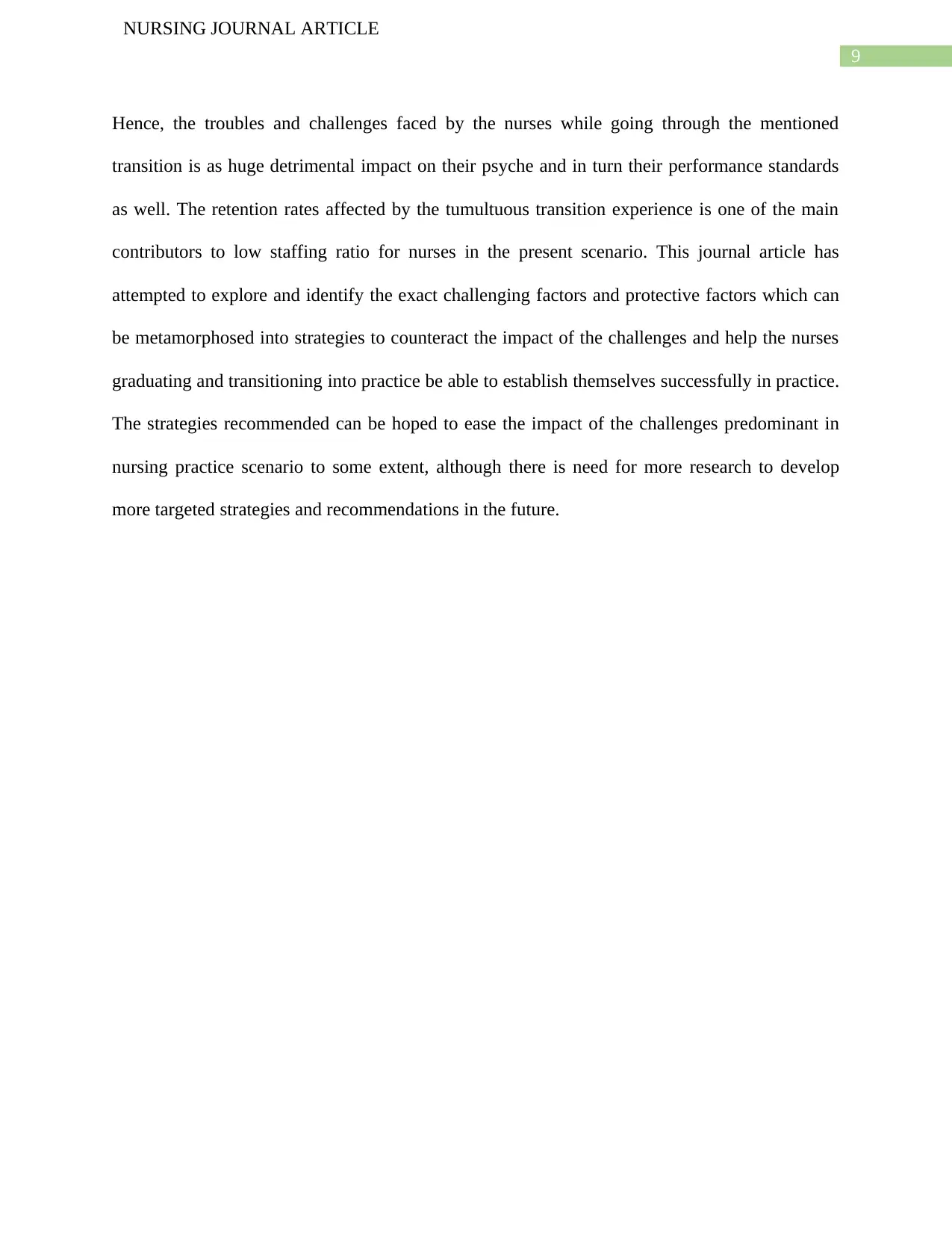
9
NURSING JOURNAL ARTICLE
Hence, the troubles and challenges faced by the nurses while going through the mentioned
transition is as huge detrimental impact on their psyche and in turn their performance standards
as well. The retention rates affected by the tumultuous transition experience is one of the main
contributors to low staffing ratio for nurses in the present scenario. This journal article has
attempted to explore and identify the exact challenging factors and protective factors which can
be metamorphosed into strategies to counteract the impact of the challenges and help the nurses
graduating and transitioning into practice be able to establish themselves successfully in practice.
The strategies recommended can be hoped to ease the impact of the challenges predominant in
nursing practice scenario to some extent, although there is need for more research to develop
more targeted strategies and recommendations in the future.
NURSING JOURNAL ARTICLE
Hence, the troubles and challenges faced by the nurses while going through the mentioned
transition is as huge detrimental impact on their psyche and in turn their performance standards
as well. The retention rates affected by the tumultuous transition experience is one of the main
contributors to low staffing ratio for nurses in the present scenario. This journal article has
attempted to explore and identify the exact challenging factors and protective factors which can
be metamorphosed into strategies to counteract the impact of the challenges and help the nurses
graduating and transitioning into practice be able to establish themselves successfully in practice.
The strategies recommended can be hoped to ease the impact of the challenges predominant in
nursing practice scenario to some extent, although there is need for more research to develop
more targeted strategies and recommendations in the future.
Paraphrase This Document
Need a fresh take? Get an instant paraphrase of this document with our AI Paraphraser
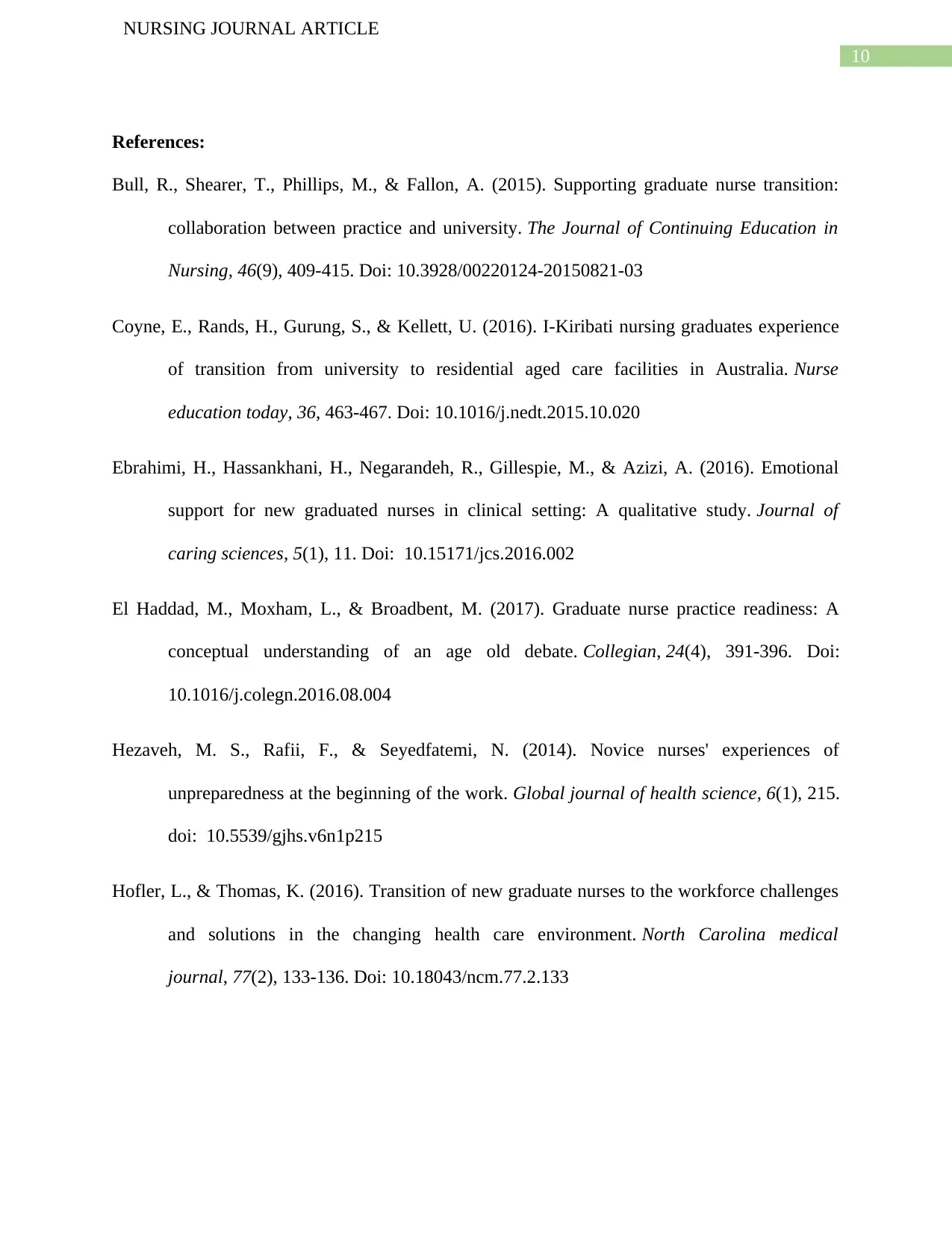
10
NURSING JOURNAL ARTICLE
References:
Bull, R., Shearer, T., Phillips, M., & Fallon, A. (2015). Supporting graduate nurse transition:
collaboration between practice and university. The Journal of Continuing Education in
Nursing, 46(9), 409-415. Doi: 10.3928/00220124-20150821-03
Coyne, E., Rands, H., Gurung, S., & Kellett, U. (2016). I-Kiribati nursing graduates experience
of transition from university to residential aged care facilities in Australia. Nurse
education today, 36, 463-467. Doi: 10.1016/j.nedt.2015.10.020
Ebrahimi, H., Hassankhani, H., Negarandeh, R., Gillespie, M., & Azizi, A. (2016). Emotional
support for new graduated nurses in clinical setting: A qualitative study. Journal of
caring sciences, 5(1), 11. Doi: 10.15171/jcs.2016.002
El Haddad, M., Moxham, L., & Broadbent, M. (2017). Graduate nurse practice readiness: A
conceptual understanding of an age old debate. Collegian, 24(4), 391-396. Doi:
10.1016/j.colegn.2016.08.004
Hezaveh, M. S., Rafii, F., & Seyedfatemi, N. (2014). Novice nurses' experiences of
unpreparedness at the beginning of the work. Global journal of health science, 6(1), 215.
doi: 10.5539/gjhs.v6n1p215
Hofler, L., & Thomas, K. (2016). Transition of new graduate nurses to the workforce challenges
and solutions in the changing health care environment. North Carolina medical
journal, 77(2), 133-136. Doi: 10.18043/ncm.77.2.133
NURSING JOURNAL ARTICLE
References:
Bull, R., Shearer, T., Phillips, M., & Fallon, A. (2015). Supporting graduate nurse transition:
collaboration between practice and university. The Journal of Continuing Education in
Nursing, 46(9), 409-415. Doi: 10.3928/00220124-20150821-03
Coyne, E., Rands, H., Gurung, S., & Kellett, U. (2016). I-Kiribati nursing graduates experience
of transition from university to residential aged care facilities in Australia. Nurse
education today, 36, 463-467. Doi: 10.1016/j.nedt.2015.10.020
Ebrahimi, H., Hassankhani, H., Negarandeh, R., Gillespie, M., & Azizi, A. (2016). Emotional
support for new graduated nurses in clinical setting: A qualitative study. Journal of
caring sciences, 5(1), 11. Doi: 10.15171/jcs.2016.002
El Haddad, M., Moxham, L., & Broadbent, M. (2017). Graduate nurse practice readiness: A
conceptual understanding of an age old debate. Collegian, 24(4), 391-396. Doi:
10.1016/j.colegn.2016.08.004
Hezaveh, M. S., Rafii, F., & Seyedfatemi, N. (2014). Novice nurses' experiences of
unpreparedness at the beginning of the work. Global journal of health science, 6(1), 215.
doi: 10.5539/gjhs.v6n1p215
Hofler, L., & Thomas, K. (2016). Transition of new graduate nurses to the workforce challenges
and solutions in the changing health care environment. North Carolina medical
journal, 77(2), 133-136. Doi: 10.18043/ncm.77.2.133
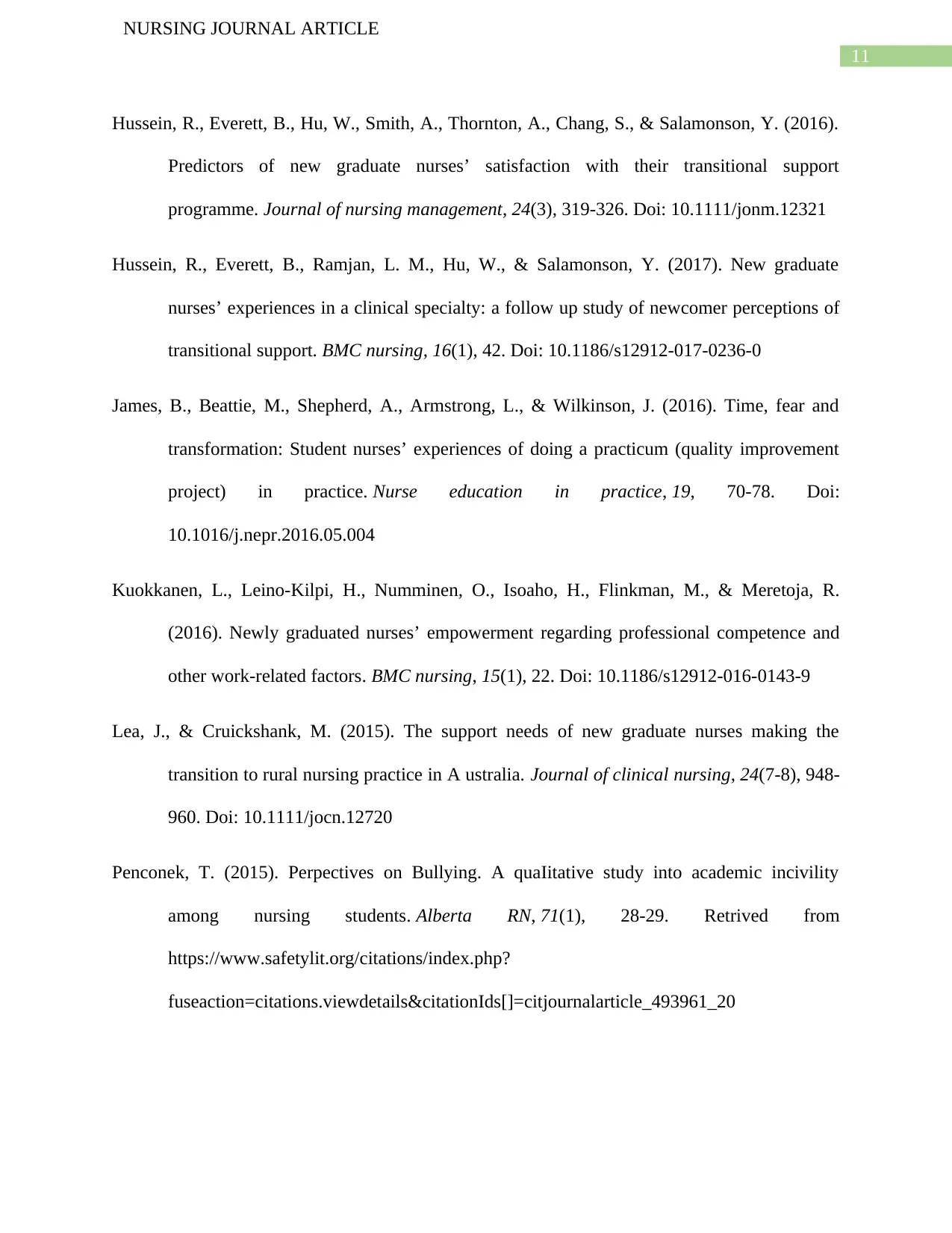
11
NURSING JOURNAL ARTICLE
Hussein, R., Everett, B., Hu, W., Smith, A., Thornton, A., Chang, S., & Salamonson, Y. (2016).
Predictors of new graduate nurses’ satisfaction with their transitional support
programme. Journal of nursing management, 24(3), 319-326. Doi: 10.1111/jonm.12321
Hussein, R., Everett, B., Ramjan, L. M., Hu, W., & Salamonson, Y. (2017). New graduate
nurses’ experiences in a clinical specialty: a follow up study of newcomer perceptions of
transitional support. BMC nursing, 16(1), 42. Doi: 10.1186/s12912-017-0236-0
James, B., Beattie, M., Shepherd, A., Armstrong, L., & Wilkinson, J. (2016). Time, fear and
transformation: Student nurses’ experiences of doing a practicum (quality improvement
project) in practice. Nurse education in practice, 19, 70-78. Doi:
10.1016/j.nepr.2016.05.004
Kuokkanen, L., Leino-Kilpi, H., Numminen, O., Isoaho, H., Flinkman, M., & Meretoja, R.
(2016). Newly graduated nurses’ empowerment regarding professional competence and
other work-related factors. BMC nursing, 15(1), 22. Doi: 10.1186/s12912-016-0143-9
Lea, J., & Cruickshank, M. (2015). The support needs of new graduate nurses making the
transition to rural nursing practice in A ustralia. Journal of clinical nursing, 24(7-8), 948-
960. Doi: 10.1111/jocn.12720
Penconek, T. (2015). Perpectives on Bullying. A quaIitative study into academic incivility
among nursing students. Alberta RN, 71(1), 28-29. Retrived from
https://www.safetylit.org/citations/index.php?
fuseaction=citations.viewdetails&citationIds[]=citjournalarticle_493961_20
NURSING JOURNAL ARTICLE
Hussein, R., Everett, B., Hu, W., Smith, A., Thornton, A., Chang, S., & Salamonson, Y. (2016).
Predictors of new graduate nurses’ satisfaction with their transitional support
programme. Journal of nursing management, 24(3), 319-326. Doi: 10.1111/jonm.12321
Hussein, R., Everett, B., Ramjan, L. M., Hu, W., & Salamonson, Y. (2017). New graduate
nurses’ experiences in a clinical specialty: a follow up study of newcomer perceptions of
transitional support. BMC nursing, 16(1), 42. Doi: 10.1186/s12912-017-0236-0
James, B., Beattie, M., Shepherd, A., Armstrong, L., & Wilkinson, J. (2016). Time, fear and
transformation: Student nurses’ experiences of doing a practicum (quality improvement
project) in practice. Nurse education in practice, 19, 70-78. Doi:
10.1016/j.nepr.2016.05.004
Kuokkanen, L., Leino-Kilpi, H., Numminen, O., Isoaho, H., Flinkman, M., & Meretoja, R.
(2016). Newly graduated nurses’ empowerment regarding professional competence and
other work-related factors. BMC nursing, 15(1), 22. Doi: 10.1186/s12912-016-0143-9
Lea, J., & Cruickshank, M. (2015). The support needs of new graduate nurses making the
transition to rural nursing practice in A ustralia. Journal of clinical nursing, 24(7-8), 948-
960. Doi: 10.1111/jocn.12720
Penconek, T. (2015). Perpectives on Bullying. A quaIitative study into academic incivility
among nursing students. Alberta RN, 71(1), 28-29. Retrived from
https://www.safetylit.org/citations/index.php?
fuseaction=citations.viewdetails&citationIds[]=citjournalarticle_493961_20
⊘ This is a preview!⊘
Do you want full access?
Subscribe today to unlock all pages.

Trusted by 1+ million students worldwide
1 out of 13
Related Documents
Your All-in-One AI-Powered Toolkit for Academic Success.
+13062052269
info@desklib.com
Available 24*7 on WhatsApp / Email
![[object Object]](/_next/static/media/star-bottom.7253800d.svg)
Unlock your academic potential
Copyright © 2020–2026 A2Z Services. All Rights Reserved. Developed and managed by ZUCOL.





